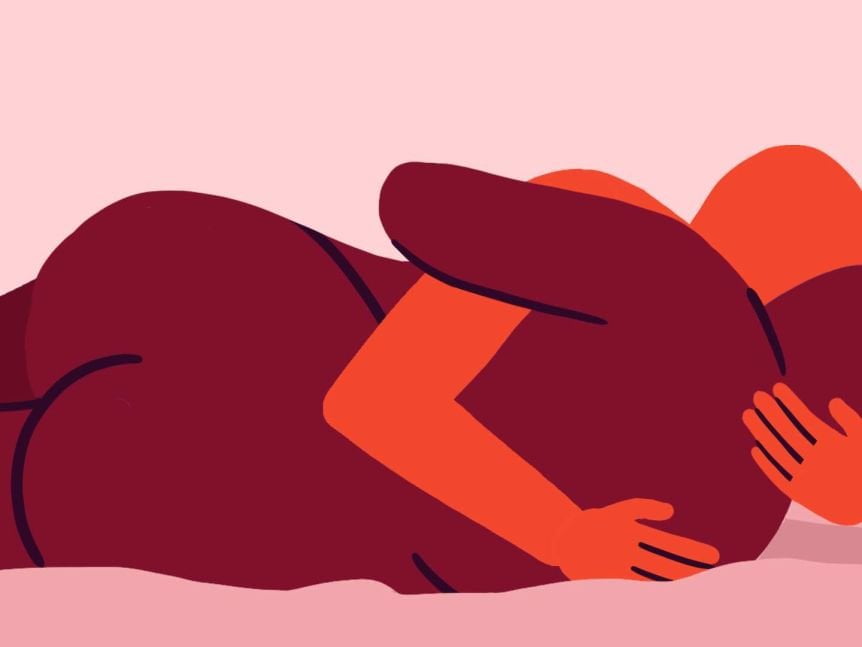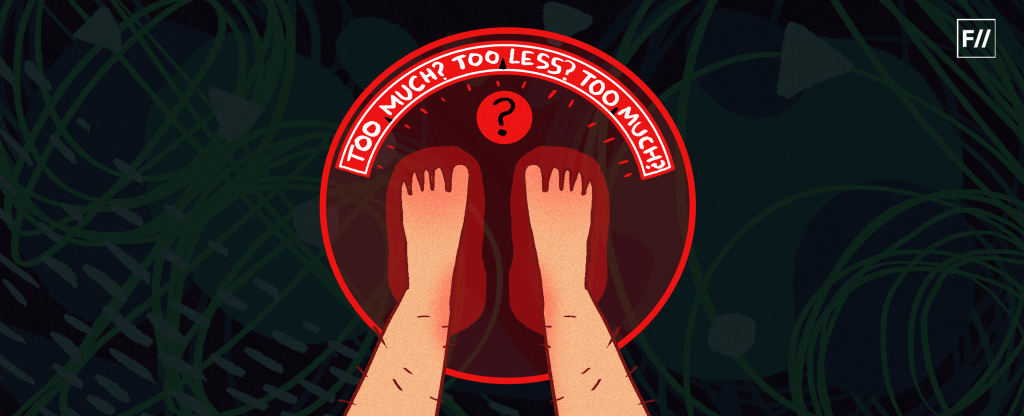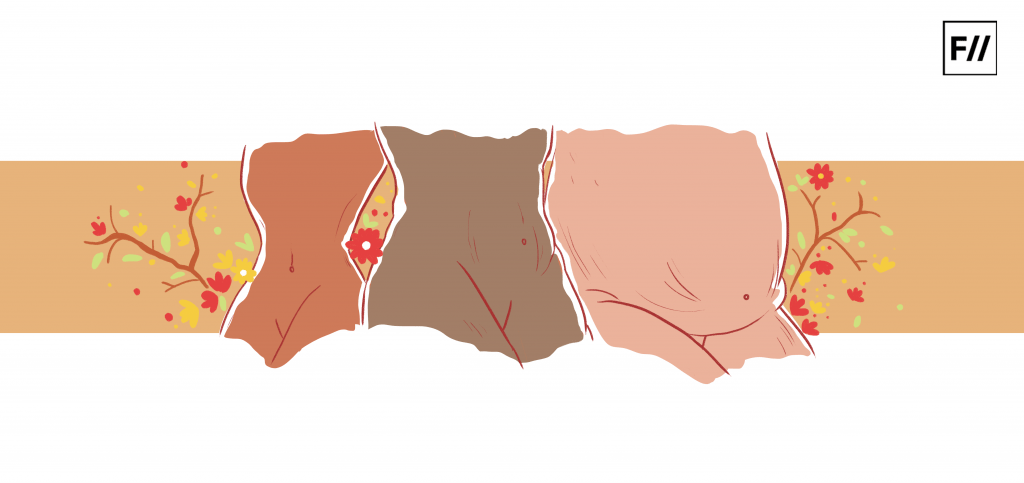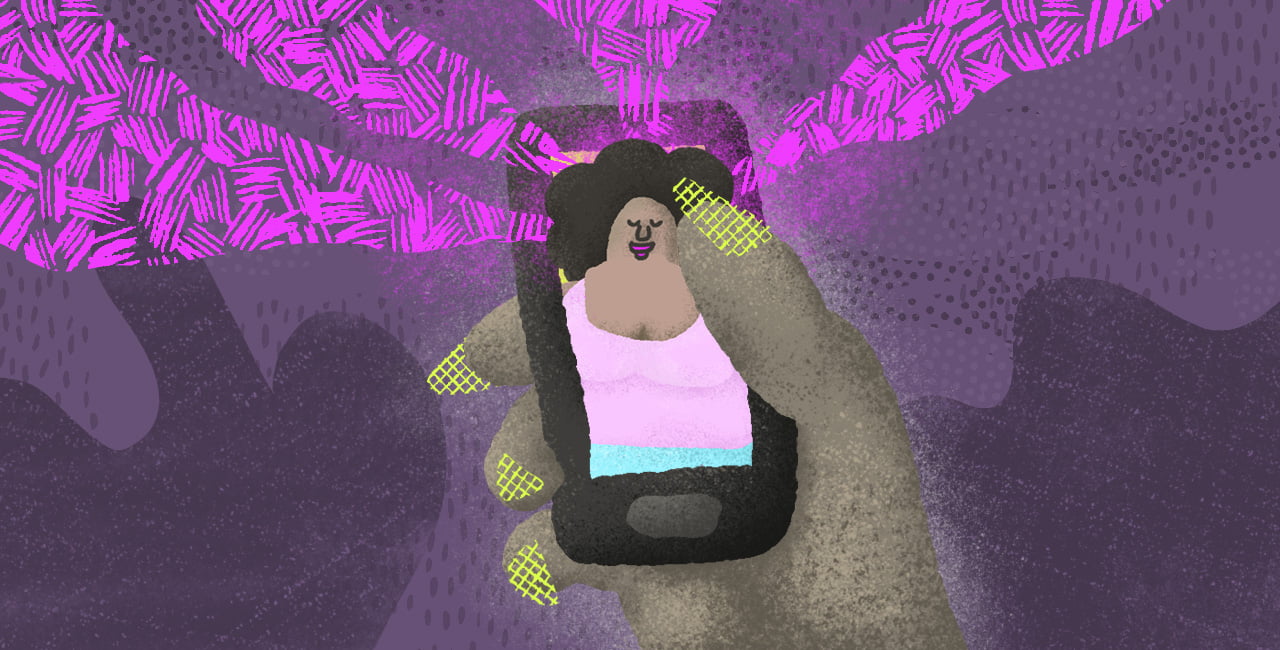Editor’s Note: This month, that is July 2020, FII’s #MoodOfTheMonth is Feminism And Body Image, where we invite various articles about the diverse range of experiences which we often confront, with respect to our bodies in private or public spaces, or both. If you’d like to share your article, email us at pragya@feminisminindia.com.
Growing up in a fat body, your value is directly associated with how you look. Whether it is being picked last in any sports-related activities in school or your parents worrying if you’ll ever be successful in job interviews, because not fitting in conventional beauty standards guarantees you not making a good ‘first impression’.
It can be difficult to navigate these paths when you don’t see any other fat women around, not in the movies you watch, the books you read or the actresses you and your friends idolize. And if you find one that exists, the person is only reduced to an anomaly or in most cases, a punchline. Figuring out these issues while trying to protect the little self-confidence you have as a teenager is hard enough; what no one prepares you for is the effect it has on your romantic and sexual self. Romantic feelings as a teenager in an Indian household is already something that is rarely spoken about, being a fat person and having desires is considered downright preposterous.

I was 12 years old when I first developed feelings for the most popular boy in my class. I was on the cusp of realization that these feelings are supposed to be ‘hidden’ for someone as fat as me. Oscillating between what I felt and what I was supposed to feel, I remember confiding in another male friend. He was feeling particularly sympathetic and decided that the best idea would be to divulge these sinful feelings to the boy in question in front of me. It’s been more than a decade since, I do not remember exactly what was said, but I can tell you exactly what I felt. Shame. An emotion I would come to strongly associate with who I am and everything I felt. That incident greatly defined how I would fare in future romantic relationships.
It can be difficult to navigate these paths when you don’t see any other fat women around, not in the movies you watch, the books you read or the actresses you and your friends idolize. And if you find one that exists, the person is only reduced to an anomaly or in most cases, a punchline. Figuring out these issues while trying to protect the little self-confidence you have as a teenager is hard enough; what no one prepares you for is the effect it has on your romantic and sexual self.
It’s almost comedic to know that the same thing happened twice afterwards. You would think I would finally learn my lesson about this recurring pattern whenever I confided in my friends. It is almost amusing the ‘saviour’ feeling it invoked in them to take pity on a poor fat girl who will obviously have no success in any romantic relationships; so by telling the boy in question, at least they can guarantee he will notice my existence if not anything else. I was made acutely aware that no boy will ever show interest in someone who looked like me and I was supposed to feel ashamed about not being more desirable.
The shame was not just reinforced by my unrequited crushes but concerned family members. “Next year you’re going to be in 9th, it’s the senior wing! Don’t you want to look better by then?”, “You’re going to be in 11th now and you’re even changing schools! No better time for a fresh start.”, “You’re going to study in North Campus, will you be able to survive looking like this?”—I wish I was misquoting people. The underlying layer of all these questions and statements was a dominant feeling of shame that I was made to internalize.
My body was something I had to constantly apologize for. Sonya Renee Taylor in her book, ‘The Body is not an Apology: The Power of Radical Self-Love’ exactly pinpoints what I felt, “Living in a female body, a Black body, an aging body, a fat body, a body with mental illness is to awaken daily to a planet that expects a certain set of apologies to already live on our tongues. There is a level of “not enough” or “too much” sewn into these strands of difference.”

Also read: Fatness, Womanhood And The Bois Locker Rooms
Fortunately, I was always what my mom describes as the rebellious or these days ‘left’ kind. I did internalize the shame but the more I was told that my feelings were an inconvenience to any prospective romantic partner, the more I made it a point in expressing them. If rejection was guaranteed, I made sure it came on my own terms. I wanted the men I had feelings for to look me in the eye and tell me that I was not ‘good enough’. Most of them could not do it and seeing them fumbling to express is what made me reclaim my feelings and oppose the shame I was supposed to feel in that moment of time.
But in dealing with the aftermath of these rejections, my body always took the brunt of my bitterness. ‘Only if I looked a certain way,’ is a sentence I recounted every time I looked in the mirror. This misplaced hurt, anger and shame resulted in me (sub)consciously hating my body and ultimately who I am. The insecurities would manifest in other ways through the job I didn’t apply to because I did not feel good enough for, the constant questioning of my intellect and value in a competitive space, the overcompensation with excess emotional labour, my inability to validate my feelings and emotional responses when it comes to any relationship.
The flaw in my plan became evident when a person came along and did show interest for the first time in my life. I would be lying if I didn’t say I was thrilled and secretly relieved but confused with this new found validation. In a secret rendezvous, when I apologetically said I was not comfortable moving beyond a certain physical involvement, I was promptly shown the door with a ‘good luck, trying to find someone else to be with you’.
It is hard not to wonder if what everyone has told you all your life has some semblances of truth. That love and desire are the monopoly of the conventionally attractive, that fat bodies are not even shown respect in rejection. The body becomes a battleground where the only outcome is you losing.
It is hard not to wonder if what everyone has told you all your life has some semblances of truth. That love and desire are the monopoly of the conventionally attractive, that fat bodies are not even shown respect in rejection. The body becomes a battleground where the only outcome is you losing.
A decade after the incident, when someone kind did reciprocate my feelings, against my best judgment I could not help but ask if so much of me did not bother him—once again, giving a man the tool to decide my worth. His firm ‘no’ brought with it an avalanche of grief that I was carrying with me all these years. It felt as if a man’s validation was enough for all the pain and antipathy I felt towards my body to lift. When things ended, he took that validation with him, once again leaving me to fill the void with shame. This became the final wake-up call. I realized that no amount of external validation could break the patterns I had developed. All this time, I was waiting for the approval of the men around me to finally ‘approve’ myself.

Also read: Why You Should Trade Body Positivity For Fat Acceptance
Only I have the power to describe my self-worth is a slow and gradual realization that has taken me years to come to terms with. On most days, I still struggle to truly believe it. But in moments of weakness, I feel heartened that I can finally hold on to the representation I so deeply craved for in my childhood. My fat girlfriends, Lizzo, Megan Crabbe, Amy Schumer, Enam Asiama, Tess Holliday, Vidya Balan and many more. They have made me realize that I am not alone in this fight and how universal and systemic fatphobia is.
As Erin Mckean said, “You don’t owe prettiness to anyone. Not to your boyfriend/spouse/partner, not to your co-workers, especially not to random men on the street. You don’t owe it to your mother, you don’t owe it to your children, you don’t owe it to civilization in general. Prettiness is not a rent you pay for occupying a space marked ‘female’.”
Featured Image Source: Remezcla





Great article!!!!!❤️ Thank you for sharing